Good evening from Houston, Texas. This is Ellen and Tyler reporting live on the latest ILTBTA post, this one on the 2005 film Good Night, and Good Luck. Your intrepid reporters for this post braved the phenomenal portrayal of a legend by David Strathairn, the silky smooth voices of Patricia Clarkson and Frank Langella, and the captivating eyes of George Clooney and Robert Downey Jr. to bring you their honest beliefs on this film. This post has been thoroughly researched and tirelessly edited to ensure complete accuracy.1 Despite being in black and white, this movie has one color on its mind: red …

Previews
What, if anything, did we know about this coming attraction before we watched it?
Ellen: I really assumed that this was going to be about the Blitz! Imagine my surprise. Imagine my even deeper surprise when I found out it was from 2005 and not like 1972. Let’s keep the magic going!
Tyler: Edward R. Murrow did radio reporting from London during The Blitz (much like a certain foreign correspondent we met previously), so you were kinda sorta on the right track! Anyway, I watched this movie in my ninth grade Social Studies class, which was … (types into calculator, doesn’t like what he sees) … many years ago, so I don’t remember too much of it. I’m excited to watch it in one sitting from the comfort of our couch instead of in fifty minute increments from the discomfort of a metal chair.
Plots & Feelings
This one’s pretty self-explanatory.
Short Version (courtesy of IMDb): Broadcast journalist Edward R. Murrow looks to bring down Senator Joseph McCarthy.
Long Version (modified from Wikipedia and formatted to fit your screen):
‘Twas a dark and stormy night … when we started watching this movie. In the actual film, we’re in a swanky banquet hall packed to the gills with people in tuxedos and pearls as dreamy jazz plays2. It’s 1958, and we’re at an event honoring the career of Edward R. Murrow, most notably for his historic fight with Senator McCarthy and generally throwing stones at giants. Murrow begins his acceptance speech gracefully, but quickly pivots into a lecture about modern television serving as a decadence and insulating viewers from tough issues.
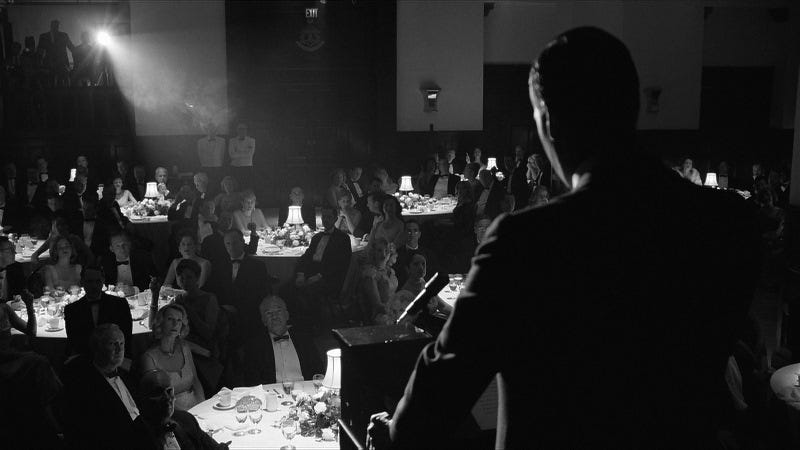
Y’all ready to get ROASTED? (Source) Cut to: five years earlier! America is overwhelmed with concerns about communists, and the panic is led by the infamous junior senator from Wisconsin: Joseph McCarthy. Over at the Columbia Broadcasting System (CBS, ever heard of it??), the TV news team bustles around, preparing for its various shows and stories. The dulcet tones (in the true, honest sense of the phrase) of Dianne Reeves take us through the scene, telling us that “TV Is The Thing This Year.” It’d all be swell if not for that loyalty oath CBS is making everybody sign, eh? In a pitch meeting for See It Now, host Ed Murrow and producer Fred Friendly get wind of the case of Milo Radulovich, a U.S. Air Force officer forcibly discharged. Why, you may ask? For refusing to denounce his sister and father with Communist leanings, duh! The show has been careful not to directly take shots at McCarthy, but CBS News’ Director Sig Mickelson warns the story may be taken that way regardless, but allows it to run.
Ellen: Besides Dianne Reeves absolutely sweeping me away, I was delighted to see Rose Abdoo and Alex Borstein, familiar faces to the Gilmore Girls crowd.
Tyler: The jazz band and use of diegetic music (yes, I had to Google “word for when music in a movie is also happening in the movie”) are just *chef’s kiss*. As you said in our notes, her voice is like being encased in velvet.
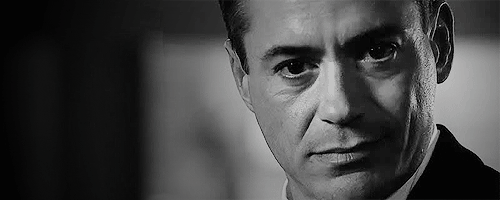
Come on, could this face be a Communist? (Source)
The network won’t pay for the ads so Ed and Fred must cough up $3,0003 themselves, and the Air Force gives Fred a talking to4, but the story goes to air! The See It Now team contends there’s no evidence Milo is a danger, and since the charges were delivered to the courtroom in a sealed envelope, the public cannot know for sure. Murrow ends the episode with a speech about how it’s up to the American people to determine balance between national security and personal liberty, and they will argue about it endlessly. Good night, and good luck. Later, Murrow is conducting an interview with Liberace on Person to Person, a fluff show that pays the bills, but his mind is clearly elsewhere. Turns out, the fallout from the lieutenant story was mostly good! Don Hollenbeck, a CBS newscaster, tells Murrow he’s proud of him, but cannot shake the depression from his divorce and also vicious attacks and accusations from columnist Jack O’Brian.
Tyler: We obviously don’t condone smoking, but there’s something extra stylish about a lingering shot of cigarette smoke in a black and white movie. I feel like the lack of color lets you play around with dramatic lighting so much more noticeably, which Clooney and his team used to great effect throughout.
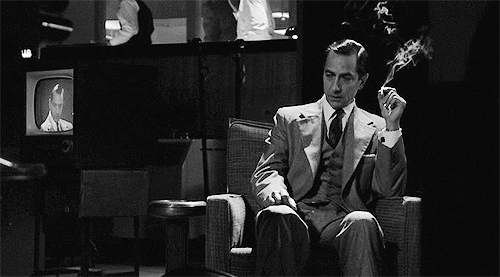
Can’t believe I wasted all that time with Mickey Rooney (Source)
A member of the See It Now team who is secretly married to one of the secretaries5 (shhh don’t worry about it) is handed a dossier on Murrow alleging all kinds of Communist-leaning wrongdoing. Murrow is subsequently hauled into the principal’s office, aka the office of CBS’ Chief Executive William Paley. The two argue about who will deal with McCarthy, and eventually Paley agrees to let Editorial do a story with which Corporate will not interfere, on the condition that everyone is squeaky clean. Fred lays it out to the room of writers and folks working on the show: the next show is about McCarthy, and if they come at him with his own words, they best not miss. A supercut of McCarthy speeches and testimony follows, interspersed with stressed-out reporters at typewriters. Right before the episode is about to air, Paley calls to offer Murrow tickets to the “Knickerbockers” game that night, but the host insists their show is airtight. What follows is an indictment of McCarthy’s methods via his own words. Ed closes by saying that “we must not confuse dissent with disloyalty… we will not walk in fear of one another.” The show closes, and everyone stares at the phones, which are silent. They’re perplexed until a page comes in and asks if he should turn them back on? Then it’s off the hook, baby!
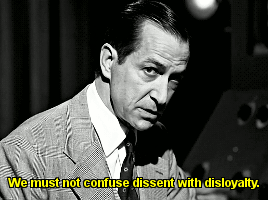
Tyler to Ellen after he yells at Eagles players to CATCH THE FUCKING BALL (Source) Everyone could sure use a Scotch, right? The team celebrates at a bar until just about exactly 3:30 AM when the early editions come out. They send Shirley out to nab some, and the reviews are in: Jack Gould at the New York Times has written a rave! O’Brian has not, slamming Hollenbeck for strongly agreeing with Murrow during the opening of his own show. Hollenbeck sits silently with the group on the verge of tears, something this author has definitely never done. The next day, rumors are already swirling about McCarthy’s inevitable rebuttal, but some substantiated news: Radulovich has been reinstated! In-between celebrating that and sitting for interviews with the CBS legal team, the gang gets to work on an episode covering the case of Annie Lee Moss. Next week, however, it’s McCarthy’s turn. He spends his time smearing Murrow rather than debunking anything they said. Murrow points that very fact out in his opening monologue next week, and then proceeds to refute or contextualize each of McCarthy’s points.
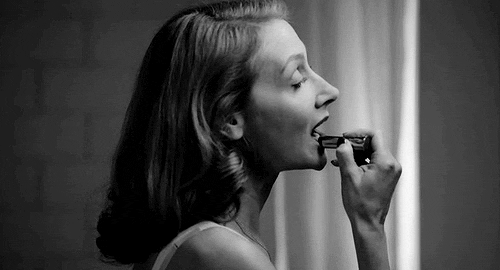
Hold onto your hats: the Senate is investigating McCarthy! Amidst the celebration, Fred gets a call, and he whispers to Ed, who looks horrified. Rightly so: Don Hollenbeck has died by apparent suicide. Later, Shirley and her secret husband Joe lie in bed, wondering if they’re protecting the right people. Just a thought. Here’s another thought for them: they’ve been called before Sig the News Director, who says layoffs are imminent, and since there’s a rule against CBS employees being married, they could save some jobs. The couple chuckles dryly and puts their wedding rings back on. This scene is mirrored by Ed and Fred being hauled into the other office: William Paley’s. He tells the duo they’ve lost their sponsor, and he’s moving their show to Sunday afternoons for 5 episodes to save costs. They get into a bit of an argument about censorship and whether it’s occurring (they don’t come to an agreement). In the hallway, Ed and Fred discuss that McCarthy will most likely be censured, moved to the back row, but not kicked out of the Senate. They may as well go down swinging6 with their show.
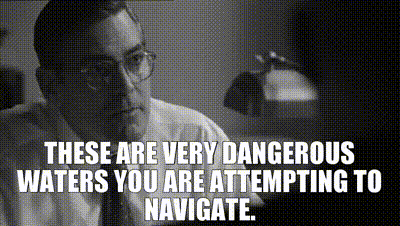
Cut back to 1958, and Edward R. Murrow is closing out his fairly scathing speech. He warns against enabling the audience to be complacent, indifferent, insulated. He implores them to see the power of television to inform and educate the public, so that it does not become only wires and lights in a box. Good night, and good luck.
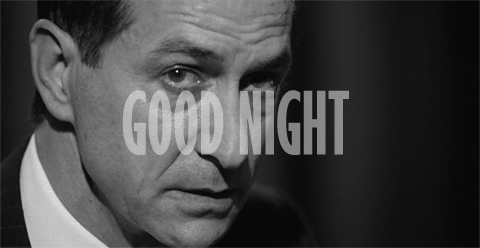
Intermission
Even though ILTBTA is free, please indulge us further and enjoy this quick “advertisement.”
This installment of ILTBTA is brought to you by … Kent cigarettes!

Use promo code ILTBTA when you buy your next pack of Kent cigarettes, and you’ll receive exactly zero (0) cigarettes because smoking is bad for you.
Wiki-Wiki-Whaaat?
Love a good Wikipedia rabbit hole in search of some fun facts? Us too.
Good Night, and Good Luck’s Wikipedia page has some interesting facts and anecdotes that we recommend you read through, but here are a few of our favorites:
Edward R. Murrow was a legendary journalist with a fascinating life and career that is certainly worth reading about, but we would like to specifically highlight that his given name is Egbert Roscoe Murrow. Egbert!
After being reinstated to the Air Force just one month after his famous See It Now segment, Milo Radulovich moved to California and was eventually hired by a weather forecasting business. That clearly worked out well for him, since he eventually went on to work for the National Weather Service and became the chief meteorologist at an airport in Lansing, Michigan.
After injuring himself on the set of Syriana months earlier, director George Clooney struggled to get the film insured. He ended up mortgaging his Los Angeles house in order to finance the film, and was paid only $1 each for writing, directing, and acting. Dallas Mavericks owner/Shark Tank shark Mark Cuban and former eBay president Jeffrey Skoll later invested additional money into the movie in exchange for executive producer credits.
Ellen: Getting $1 for each of those tasks is 10 times funnier than just doing it for free.
The CBS studios and offices in the film were all shot on a single soundstage. In order to shoot a pair of scenes where characters took an elevator to different floors, the “elevator” was built on a giant turntable at the intersection of two sets. When the elevator doors closed, the elevator would rotate between sets until the doors reopened.
The film’s soundtrack (featuring singer Dianne Reeves plus Peter Martin, Christoph Luty, Jeff Hamilton, and Matt Catingub) won the Grammy Award for Best Jazz Vocal Album, which Reeves has won five times.
Ellen: It’s absolutely worth the listen. And since it already ‘tis the season for some of you sickos, she has a Christmas album as well.
GN&GL was nominated for six Academy Awards, including Best Actor for David Strathairn’s portrayal of Edward Murrow and Best Director for George Clooney. It was also nominated for three AARP Movies for Grownups Awards, somehow-not-fake awards that we first discovered in our Nightmare Alley post.
Tyler: Let’s add the AARP Movies for Grownups Awards nominees to our list of potential ILTBTA spin-offs7. We should start brainstorming newsletter names now …
Despite the critical acclaim it received, one complaint among test audiences was that the actor portraying Senator McCarthy was too over the top, clearly not realizing that GN&GL used archival footage of McCarthy himself.
Ellen: Which reminds me, did Bill Murray ever parody McCarthy? Because I see it.
Tyler: I don’t think so, but I definitely see the resemblance!
Honorable Mentions
What other movies should you be watching?
If you were intrigued by the journalism portrayed in Good Night, and Good Luck but want a more modern and realistic portrayal, look no further than our next Honorable Mention: Spotlight. Winner of the 2015 Academy Award for Best Picture, Spotlight follows the true story of investigative journalists from The Boston Globe as they uncover systemic child sex abuse within the Catholic Church in the Boston area, for which they won the Pulitzer Prize for Public Service. It was directed by Tom McCarthy, who coincidentally acted in GN&GL.
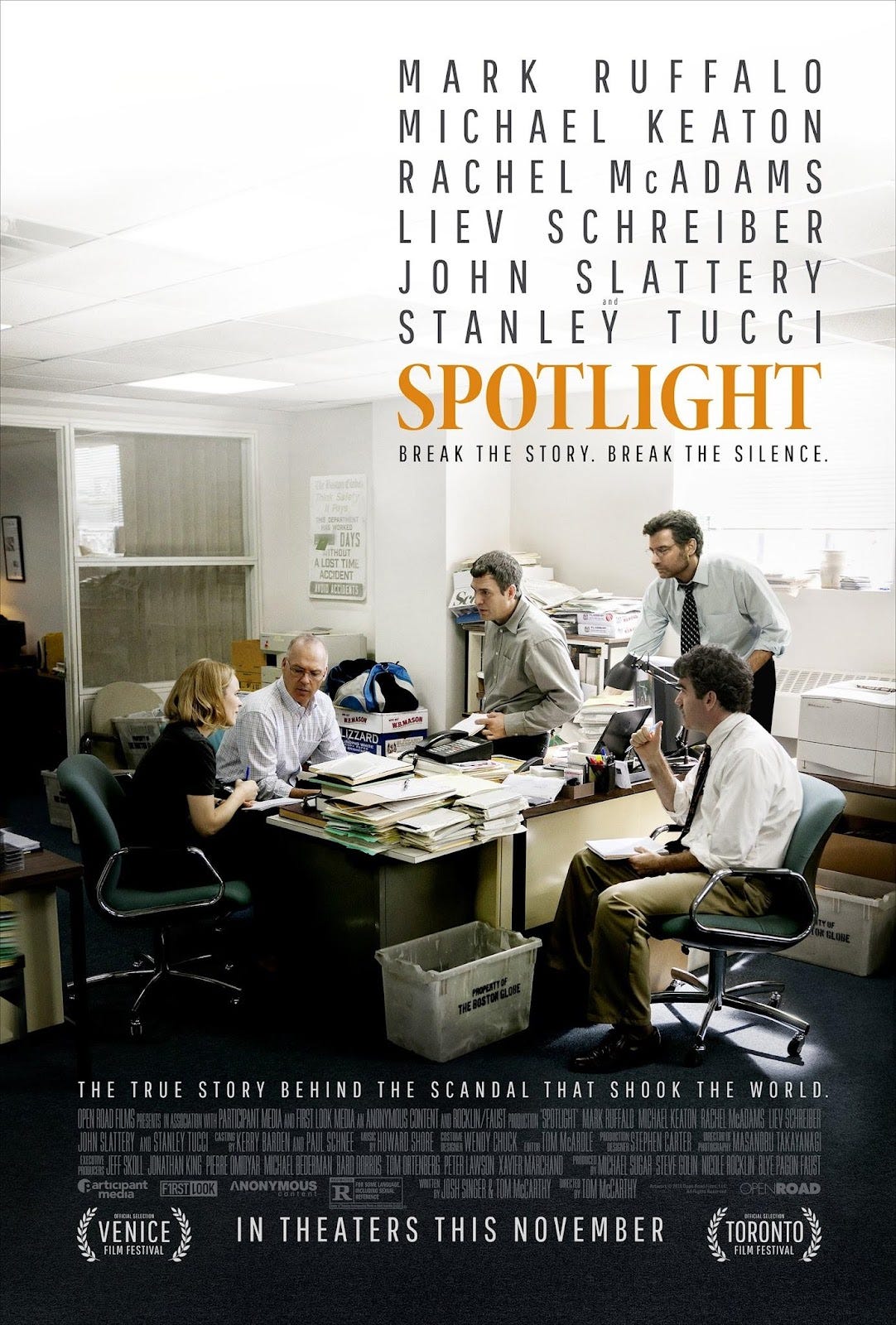
Look, we’re not gonna lie, Spotlight is not exactly a feel-good movie, but that doesn’t make it any less worth watching to appreciate the dogged investigating and commitment to fixing a societal ill that is portrayed throughout. As Ellen mentioned in The Spreadsheet, Spotlight is “extremely well-acted, depressing, and worthwhile.” Maybe palate cleanse with a comedy afterwards?
Spotlight is available to stream on HBO Max.
Fill In The Blank
How did we really feel about The Academy nominating this?
Ellen: I’d like to wish the Academy “good luck” at emotionally resonating with these characters. I felt like this movie was well-made, well-acted, and I enjoyed watching it. However, the more I thought about it, the more I realized how kind of inscrutable all of these people were. You can argue that from a public-facing perspective, that’s how they had to act in an environment of fear and intimidation. But this is a movie, and it should afford us the opportunity to observe and gain insight into the interior lives of these people, and the film doesn’t really capitalize on that. The quick, more candid scenes between our secretly married couple weren’t enough for me to invest in all of these characters personally, even though I had strong investment in the battle they were fighting (which makes this the opposite of The Crying Game in that way). Furthermore, like Mank and Being the Ricardos after it, it seemed to be for a specific audience who already knows a lot about this time period, and I need to be pulled along a little more. It’s certainly worth watching, but I wanted more.
Tyler: I’d like to give the Academy a celebratory glass of scotch, but not at 3 AM because I will have said “good night” long before then. I admit, I’m a sucker for some soaring rhetoric about the state of the country and/or its media ecosystem. (Hell, most of Murrow’s speeches were like slowed-down versions of what Aaron Sorkin thought The Newsroom sounded like.) But even aside from the writing, I thought GN&GL did a fantastic job of nailing the vibes of the time, whether that be through the aforementioned lovely music, the also-aforementioned dramatic black and white shots, the use of archival footage, or the actors themselves. A well-done movie all around that’s sadly becoming more and more relevant.
Let The Credits Roll
Thanks for reading! Some quick housekeeping as you exit the theatre:
If you have plots and feelings of your own (on the movie or ILTBTA in general), feel free to comment on the post or simply reply to the email. If you liked reading this: tell your friends! If you hated reading this: tell your friends how much you hated it by forwarding it to them!
If you’re a weirdo like Tyler and use Twitter, feel free to follow us there @BlankTheAcademy for ILTBTA updates, rejected jokes, and other random movie-related musings. Once we reach a million followers, we’ll offer to purchase the @ILTBTA handle from the butthead who snagged it before us.
If you’d like to start a wild Best Picture journey of your own, feel free to download a copy of The Spreadsheet. Bonus: checking off the boxes is oddly satisfying.
Post-Credits Scene
Get a sneak peek at the next ILTBTA installment.
Given that our next post will be our last one as an engaged couple (and wedding planning has taken over our brains), we decide to watch a lighthearted yet relevant movie for the situation: Frank Capra’s 1938 rom-com You Can’t Take It With You. Starring Jean Arthur and Jimmy Stewart as an engaged couple who meets the other’s family: one rich snobs, the other a little eccentric. (We’ll let you, dear readers, decide exactly how relevant that is to our situation.) You Can’t Take It With You is available to rent via the usual who’s who of our current and future tech overlords.
Until then … good night, and good luck.
Jk neither of those are true.
What is this, our wedding dinner?
That’s about $33,500 in today’s dollars!
Specifically, it’s two Colonels, which Murrow contends equals a General.
Sounds like my ex-wife!
Ellen: Much like the Phillies this weekend, amirite?
Tyler: Too soon, Ellen.
Along with Oscar snubs, Best Animated Feature nominees, and certain Razzie Award winners.




